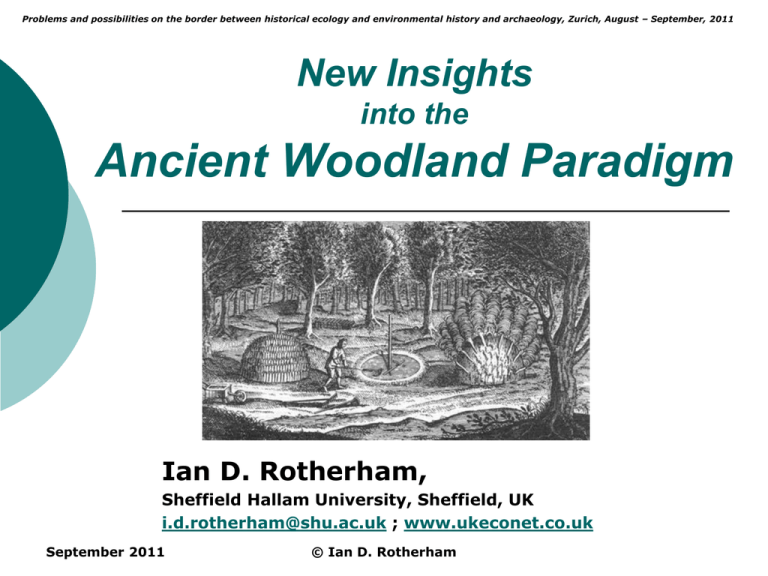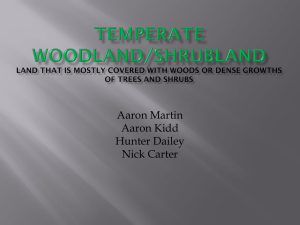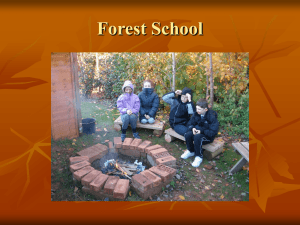New insights into the ancient woodland paradigm
advertisement

Problems and possibilities on the border between historical ecology and environmental history and archaeology, Zurich, August – September, 2011 New Insights into the Ancient Woodland Paradigm Ian D. Rotherham, Sheffield Hallam University, Sheffield, UK i.d.rotherham@shu.ac.uk ; www.ukeconet.co.uk September 2011 © Ian D. Rotherham Issues of misunderstanding and lack of communication highlighted …. Especially between – ECOLOGISTS, ARCHAEOLOGISTS, PLANNERS , FORESTERS & OTHER MANAGERS, and HISTORIANS A NATURAL / CULTURAL PARADIGM in dealing with wooded landscapes Rotherham, I.D. (2007d) The implications of perceptions and cultural knowledge loss for the management of wooded landscapes: a UK case-study. Forest Ecology and Management, 249, 100-115. Rotherham, I.D. & Ardron, P.A. (2006) The Archaeology of Woodland Landscapes: Issues for Managers based on the Case-study of Sheffield, England and four thousand years of human impact. Arboricultural Journal, 29 (4), 229-243. The problem of ‘ancient woods’ Across Europe but especially in Great Britain considerable demand to identify 'ancient woods' To apply planning protection and conservation management Complicated by a lack of awareness of the natureculture complexity of woodland origins Lack of over-arching cross-disciplinary approaches to wooded landscapes Contemporary conservation management Treats these areas as 'natural' when in fact they have been modified by human use for millennia The systems developed for the Woodland Heritage Manual (Rotherham et al., 2008) provide a framework For coherent application of ecological, historical, and archaeological evidence to ancient woods and other wooded landscapes 'Shadow Woods' research project & Ancient Woodland Indicators research Further development To identify and assess overlooked ancient wooded landscapes In-depth research on 'Woodland Indicators' - provides a testable toolkit for evidencing ancient woodland status for planning authorities and others The 2008 publication of the Woodland Heritage Manual (Rotherham et al., 2008) Provided for the first time, a coherent guidance and approach to the assessment of ancient wooded landscapes Methodology marries field ecology, archaeology, pedology, cartographic analysis, and historical and archival research A wider application & relevance Ideas from the Woodland Heritage Manual are tested in Poland with multi-disciplinary work led by Tomasz Samojlik and colleagues Again taking a multi-disciplinary approach to examine the degree to which forest landscapes have been altered from the natural condition by human impacts The study develops ideas first proposed by McIntyre & Hobbs (1999). Since the publication, and in parallel to the woodland heritage project……. 1) Developing a critical analysis of the application of woodland botanical indicators 2) Re-assessment of the placement of ‘ancient woods’ within an historical timeline in England The ideas of Frans Vera on woodland and parkland origins….. Our current work sits alongside research into the historical ecology of medieval deer parks and their relationships to the great European savannah as proposed Vera Attempts to place it within a cultural ecological and historical timeline – to link the conjectural Vera primeval landscape to the known medieval Joining practitioner observation to history and historical ecology and informed by archaeology The approach is based largely on work in the UK But being tested and applied in other European countries Research on indicators with the Woodland Trust and British Ecological Society To inform and test the designation of ‘ancient woodland’ status in the UK planning control process Fresh insights into Historical Factors (Rotherham & Wright, 2008), These methodological approaches help bring coherence to wooded landscapes studies The work begins to place medieval ancient woods into a wider context of wooded landscapes And beyond this, into the landscape of Vera’s claimed primeval savannah. Some Key Steps in the Process…. Evidencing Ancient Woodlands and the Use of Indicators Ancient Woodland Inventories Robust Methodologies Indicators and Their Use The Importance of Ancient and Veteran Trees in Woodland See Table1. Evidence-based Ancient Woodland Status Grid Tested by means of Intelligent Interrogation More detail in…….. Rotherham, I.D. (Ed.) (2007) The History, Ecology and Archaeology of Medieval Parks and Parklands. Wildtrack Publishing, Sheffield. Rotherham, I.D. (2007d) The implications of perceptions and cultural knowledge loss for the management of wooded landscapes: a UK case-study. Forest Ecology and Management, 249, 100-115. Rotherham, I.D. (2008) The Importance of Cultural Severance in Landscape Ecology Research. In: Dupont, A. & Jacobs, H. (Eds.) (2008) Landscape Ecology Research Trends. Nova Science Publishers Inc., New York, 71-87. Rotherham, I.D. (2011a) A Landscape History Approach to the Assessment of Ancient Woodlands. In: Wallace, E.B. (Ed.) Woodlands: Ecology, Management and Conservation. Nova Science Publishers Inc., USA, 161-184. Rotherham, I.D. (2011b) The implications of cultural severance in managing vegetation for conservation. Aspects of Applied Biology, 108, 95-104. Rotherham, I.D. (2011c) Animals, Man & Treescapes – perceptions of the past in the present. Landscape Archaeology & Ecology, 9, (in press). Rotherham, I.D. & Ardron, P.A. (2006) The Archaeology of Woodland Landscapes: Issues for Managers based on the Case-study of Sheffield, England and four thousand years of human impact. Arboricultural Journal, 29 (4), 229-243. Rotherham, I.D., Jones, M., Smith, L. & Handley, C. (Eds.) (2008) The Woodland Heritage Manual: A Guide to Investigating Wooded Landscapes. Wildtrack Publishing, Sheffield http://www.ukeconet.co.uk/










